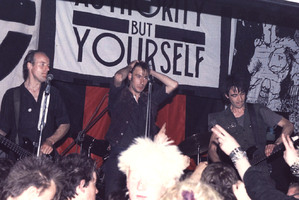I have a piece in the current issue of Uncut about Crass, a unique band who mixed music and politics in such way that they really did inspire a new way of life, and thinking about life, for their followers. Theoretically, Crass were punks – and their music was loud, aggressive, fast and very direct – but they also advocated a philosophy that tried to combine humanism with libertarianism: be true to yourself but care about others. That balance of selfishness and selflessness creates a circle that isn’t always easy to square, but Crass’s absolute dedication to their message makes their story a fascinating one. “There is no authority but yourself,” they sang, a message that’s not a million miles from Aleister Crowley’s “Do what thou wilt shall be the whole of the law.”

I’ve always been fairly sceptical about the idea there was a sharp divide between punks and hippies, and Crass are a case in point. They were every bit a product of the 60s counterculture as much as they were 1976. The band were even formed in a commune in Epping Forest that was founded in the sixties and was dedicated to that concept of dropping out. Crass were anti-war and promoted vegetarianism and identity politics. They screened avant-garde films and took part in Situationist-inspired stunts against the mass media.
Crass co-founder and drummer Penny Rimbaud was a fan of the Beatles as well as Patti Smith and Television. Here he is on Ready Steady Go winning a prize from his idol John Lennon. Rimbaud says that Lennon’s increasingly bold political and artistic statements in collaboration with Yoko Ono from 1968 were a model for Crass.
And yet few bands embraced the spirit of punk as much as Crass, who arranged their own gigs, ran their own label and communicated directly with their fans. They were in-your-face and anti-establishment, and their love of slogans, uniforms and banners caught some of punk’s militaristic fetish. A song like “Owe Us A Living” could surely only have been written in the punk era.
Rimbaud, as intellectually challenging an interviewee as any I have spoken to, discussed some of this during our conversation. “Punk wasn’t really about nihilism, that was just the theatre of McLaren,” he told me. “The Slits were a hippie band in appearance and attitude. Hippie was about people looking to find a way to live differently, what is now called DIY and is vaunted but was then common sense. You grew your own food and looked after yourself. The big difference was that punk was more urban. It was still people squatting and wearing strange clothes. People like McLaren tried to cash in on that natural and very long-existent form of youth discovery. It’s not protest, it’s youth discovering itself by buggering about. It’s only a big deal when somebody tries to market it, and punk and hippie were both exploited to the hilt.”
Read more in the current Uncut.

I think what confuses matters is that, looking back now, we see “hippie” culture in its purest (and best?) form, which did have a lot in common with the self-starting anti-authoritarianism of punk (and even more in common with Crass’s anarchism & pacifism). At the time – and particularly when it was used as an insult – “hippie” just meant wearing flares and long hair; and everyone wore flares and long hair (by 1976 even business suits had a discreet flare). Punk was against “hippies”, but what it meant by that wasn’t Haight Ashbury or the Whole Earth Catalog – it was people who owned Yessongs or Frampton Comes Alive, and read Michael Moorcock or Jonathan Livingstone Seagull. (In other words, most people.) For a while the letters pages of Snouds and NME regularly featured what were basically conversion narratives – “Until last week I was a hippie – I wore my hair long and went to one gig a year”…